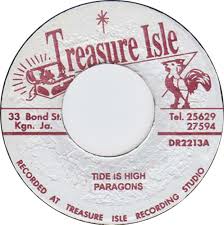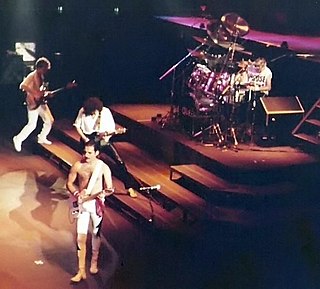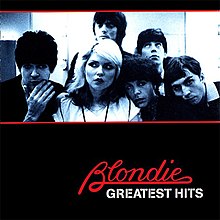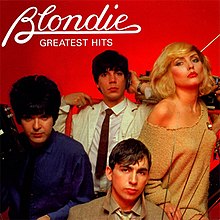
Parallel Lines is the third studio album by American rock band Blondie, released in September 1978, by Chrysalis Records to international commercial success. The album reached No. 1 in the United Kingdom in February 1979 and proved to be the band's commercial breakthrough in the United States, where it reached No. 6 in April 1979. In Billboard magazine, Parallel Lines was listed at No. 9 in the top pop albums year-end chart of 1979. The album spawned several successful singles, notably the international hit "Heart of Glass".

No Exit is the seventh studio album by American rock band Blondie, released on February 23, 1999, by Beyond Music. It was the band's first album in 17 years and features the UK number-one single "Maria". As of March 2006, the album had sold two million copies worldwide.

Greatest Hits II is a compilation album by the British rock band Queen, released on 28 October 1991. The album consisted of Queen's biggest hits between 1981 and 1991, from the UK chart-topper "Under Pressure" to "The Show Must Go On".

Greatest Hits is a compilation album by the British rock band Queen, released worldwide on 26 October 1981. The album consisted of Queen's biggest hits since their first chart appearance in 1974 with "Seven Seas of Rhye", up to their 1980 hit "Flash". There was no universal track listing or cover art for the album, and each territory's tracks were dependent on what singles had been released there and which were successful. In 1992, the US version of the album Classic Queen was released following the band's rekindled popularity in the nation.

Greatest Hits is the second greatest hits album and second compilation album by the Red Hot Chili Peppers. It was released on November 18, 2003, by Warner Bros. Records. Aside from their cover of "Higher Ground", all songs on the album are from the band's tenure on Warner Bros. Records from 1991 to 2002, in addition to two newly recorded songs.

"Call Me" is a song by the American new wave band Blondie and the theme to the 1980 film American Gigolo. Produced and composed by Italian musician Giorgio Moroder, with lyrics by Blondie singer Debbie Harry, the song appeared in the film and was released in the United States in early 1980 as a single. "Call Me" was No. 1 for six consecutive weeks on the Billboard Hot 100 chart, where it became the band's biggest single and second No. 1. It also hit No. 1 in the UK and Canada, where it became their fourth and second chart-topper, respectively. In the year-end chart of 1980, it was Billboard's No. 1 single and RPM magazine's No. 3 in Canada.

"One Way or Another" is a song by American new wave band Blondie from their 1978 album Parallel Lines. Lyrically, the song was inspired by Blondie frontwoman Deborah Harry's experience with a stalker in the early 1970s, an incident which forced her to move away from New Jersey. The song's music was composed by bassist Nigel Harrison, who introduced the Ventures-influenced track to keyboardist Jimmy Destri.

"Heart of Glass" is a song by the American new wave band Blondie, written by singer Debbie Harry and guitarist Chris Stein. It was featured on the band's third studio album, Parallel Lines (1978), and was released as the album's third single in January 1979 and reached number one on the charts in several countries, including the United States and the United Kingdom.

Eat to the Beat is the fourth studio album by American rock band Blondie, released on September 28, 1979, by Chrysalis Records. The album was certified Platinum in the United States, where it spent a year on the Billboard 200. Peaking at No. 17, it was one of Billboard's top 10 albums of 1980. It also reached No. 1 on the UK Albums Chart in October 1979 and has been certified Platinum by the British Phonographic Industry (BPI).

"Atomic" is a song by American rock band Blondie from their fourth studio album, Eat to the Beat (1979). Written by Debbie Harry and Jimmy Destri and produced by Mike Chapman, the song was released in February 1980 as the album's third single.

Autoamerican is the fifth studio album by American rock band Blondie. It was released in November 1980 and reached No. 3 in the UK charts, No. 7 in the US, and No. 8 in Australia. The album spawned two singles from this album, "The Tide Is High" and "Rapture". "The Tide Is High" hit number one in several countries, including the US and the UK. "Rapture" became the first rap song ever to reach number one on the singles chart in the US. It also reached number five in the UK and number four in Australia.

"The Tide Is High" is a 1967 rocksteady song written by John Holt, originally produced by Duke Reid and performed by the Jamaican group The Paragons, with Holt as lead singer. The song gained international attention in 1980, when a cover version by the American band Blondie became a US and UK number one hit. The song topped the UK Singles Chart again in 2002 with a version by the British girl group Atomic Kitten, while Canadian rapper Kardinal Offishall had a minor hit with his interpretation in 2008.

"Rapture" is a song by American rock band Blondie from their fifth studio album Autoamerican (1980). Written by band members Debbie Harry and Chris Stein, and produced by Mike Chapman, the song was released as the second and final single from Autoamerican on January 12, 1981, by Chrysalis Records. Musically, "Rapture" is a combination of new wave, disco and hip hop with a rap section forming an extended coda.

The Best of Blondie is the first greatest hits album by American rock band Blondie. It was released in October 1981, by Chrysalis Records. The album peaked at number four in the United Kingdom and number 30 in the United States, while becoming the band's only number-one album in Australia.

"Maria" is a song by American rock band Blondie. The song was written by Blondie keyboardist Jimmy Destri and produced by Craig Leon. Taken from their seventh album, No Exit (1999), it was Blondie's first new release since 1982. "Maria", issued as a single in Europe on January 11, 1999, reached number one in the United Kingdom; Blondie's sixth UK chart-topper. The song also topped the charts of Greece and Spain, becoming a top-20 hit across Europe and in New Zealand.

The discography of the British punk rock band the Clash consists of six studio albums, two extended plays, two live albums and 31 singles.

British rock band Queen have released 15 studio albums, 10 live albums, 16 compilation albums, two soundtrack albums, 2 extended plays, 73 singles, and seven promotional singles. Queen was formed in London by Freddie Mercury, Brian May (guitar), and Roger Taylor (drums), and in 1971, John Deacon (bassist) became a member.

Greatest Hits is a CD/DVD compilation album by the band Blondie released in the UK on November 8, 2005 and internationally on March 6, 2006. It peaked at number 48 on the UK Albums Chart and charted for 7 weeks. This was the first Blondie hits package to combine the CD and DVD formats.

Atomic: The Very Best of Blondie is a greatest hits album by American rock band Blondie, released on July 13, 1998, by Chrysalis Records, at the time when the band reunited and shortly before the beginning of their successful comeback tour.

Greatest Hits is a greatest hits album released by American rock band the Foo Fighters on November 3, 2009.





















